Peter Symonds, wsws.org
Update: The casualty count is now approaching 900, and there’s news of another building collapse with hundreds of victims.

While the world of fashion trots out their pampered creatures on the red carpet all over the world, the actual makers of these garments suffer poverty and death through hyper exploitation. You know who Heidi Klum is, but do you know who this person is? In the world of power and fame, anonymity is death.
Two weeks after the Rana Plaza building collapse, global retail giants that source their garments in Bangladesh such as Walmart, Primark, Benetton and others are engaged in a cynical public relations exercise to distance themselves from the tragedy and preserve their image and their profits.
As of yesterday, the official death toll had reached 705, with hundreds more injured, making the collapse the worst industrial disaster in country’s history and one of the worst ever in the world. Rana Plaza is typical of the thousands of shoddily built, unsafe sweatshops in Bangladesh employing workers at $38 a month to churn out orders for some of the world’s largest corporations.
A well rehearsed media operation swung into action as soon as news of the April 24 disaster began to emerge. The well-resourced PR departments of the corporations directly or indirectly involved immediately issued statements expressing their “shock” and “sadness” over the loss of life. Most attempted to deny any involvement with the five garment factories housed in the building, no doubt advised by their equally well-resourced legal departments. A few acknowledged their connection to the Rana Plaza suppliers.
The crocodile tears and declarations of “shock” are completely hypocritical. The very reason some of the best known international brands source their goods in Bangladesh is that the country has the lowest costs—not only low wages, but low overheads due to the lack of regulation. Safety and building standards exist largely on paper, as the government employs very few inspectors to enforce the codes in a country that is notorious for corruption and bribery.
[pullquote] As long as the world’s governments remain in the hands of the superrich, nothing will change, except for occasional cosmetics. In the wake of this disaster the utterly corrupt and incompetent government of Bangladesh is working with the corporate elites who own the brands and governments in the developed world to put a mask of contrition and “reform” on the catastrophe. A revolting spectacle for anyone who can see the hypocrisy of the situation.—Eds.[/pullquote]Many corporations maintain a façade of concern by setting guidelines for their suppliers backed by a system of “audits”, supposedly to ensure that standards are met. Auditing for safety and working conditions has become an industry in itself, in which non-government organisations (NGOs) are involved. The guidelines are ignored and orders are commonly subcontracted to smaller sweatshops. The audits are little more than occasional nuisances as manufacturers cut costs to meet the price demanded.
One monitoring group, the Business Social Compliance Initiative, based in Brussels, has admitted that its auditors approved two of the garment factories inside Rana Plaza on behalf of their clients. The structural soundness of the building was simply not on the check list.

A man holds his daughter’s photo and ID card which she used while working at a garment factory which collapsed last week in Savar near Dhaka, Bangladesh, Sunday, May 5, 2013. Police said more than 700 bodies have now been recovered from the ruined building on Sunday and the grim recovery work continues. (AP Photo/Ismail Ferdous)
The sheer scale of the Rana Plaza disaster, which has horrified people around the world, has compelled the retail giants to consider moving their business elsewhere. The New York Times highlighted the fact last week that the Walt Disney Company, the world’s largest licenser with annual sales of nearly $40 billion, had issued a directive in March ordering an end to the production of branded merchandise in Bangladesh and several other countries. Disney products had been found in the ruins of the Tazreen Fashion factory that was gutted by fire last November, killing 112 workers.
At the time, the fire was the country’s worst industrial disaster. However, Disney’s directive to pull out was a purely commercial decision. The cost to its corporate image simply outweighed the relatively small impact on its profits, as only a tiny proportion of its products are produced in Bangladesh. In its statement, Disney announced that production would be phased out over a year. It left the door open to returning if factories began cooperating with the Better Work program jointly run by the International Labour Organisation (ILO) and the International Finance Corporation, connected to the World Bank.
Corporations that are in no position financially to withdraw have called on the services of the ILO, the trade unions and various NGOs to pressure the Bangladeshi government and manufacturers to make cosmetic changes to safety and building standards. Last week, the Bangladesh Garment Manufactures & Exporters Association (BGMEA), which is desperate to retain its global customers, met with representatives of 40 buyers, including H&M, JC Penny, Gap, Nike, Li & Fung and Tesco. It promised to carry out building inspections of all its members.
Some corporations, such as Primark, are promising to pay compensation of around $1,200 to each of the families of the victims of the Rana Plaza disaster. Walmart, which was directly implicated in the Tazreen Fashion disaster, has refused to pay what amounts to hush money, but has donated $1.6 million towards a token fire safety training program in Bangladesh. The amounts are a pittance, undoubtedly calculated through the methods of cost-benefit analysis used by Disney to reach its decision.
The European Union, acting on behalf of Europe’s retailers, issued a statement last week threatening to withdraw preferential trade access to EU markets for Bangladesh. Foreign policy chief Catherine Ashton and trade commissioner Karel De Gucht declared that the EU was considering “appropriate action” to “incentivise responsible management of supply chains involving developing countries.” Some 60 percent of Bangladesh’s garment exports go to Europe.
The EU posturing has nothing to do with improving the lot of Bangladeshi workers. EU officials told the Financial Times that the withdrawal of trade preferences would be “an extreme measure” which was “unlikely” to take place. As one European Commission official told the newspaper, the statement directed at Bangladeshi authorities was only to “put a fire under their feet a little bit.”
If trade preferences were withdrawn, or major corporations followed Disney’s example, the impact on the Bangladesh economy would be devastating. Garments constitute about 80 percent of the country’s exports and more than 3 million workers are directly employed in the industry. Many would lose their jobs, compounding the widespread poverty that already afflicts the Bangladeshi masses.
Moreover, any corporate exits from Bangladesh would only be to another cheap-labour platform, possibly with even lower costs. Burma (Myanmar) is being touted as a possible alternative, where the military-dominated regime would ensure a docile workforce with few safety regulations. The rush to meet the new demand would ensure that buildings were flung up in a similar haphazard and shoddy fashion. Other possibilities include Pakistan, where nearly 300 workers died in a Karachi garment factory fire last September, or the sweatshops in countries such as Sri Lanka, Cambodia and Haiti.
Far from improving safety standards and working conditions, the corporate giants are engaged in a dog-eat-dog competition against their rivals that is intensifying amid the global breakdown of capitalism. The relentless drive for profits is undermining the health, safety and living standards not only of workers in the developing countries, but also in the economically advanced nations. The only means for ending the tragic loss of life and limb is a unified -struggle by workers throughout Asia, Europe, the US and the world to put an end to the outmoded capitalist system and establish a rationally planned world socialist economy to meet the pressing needs of humanity.
Peter Symonds writes for wsws.org, an information resource of the Socialist Equality Party.


